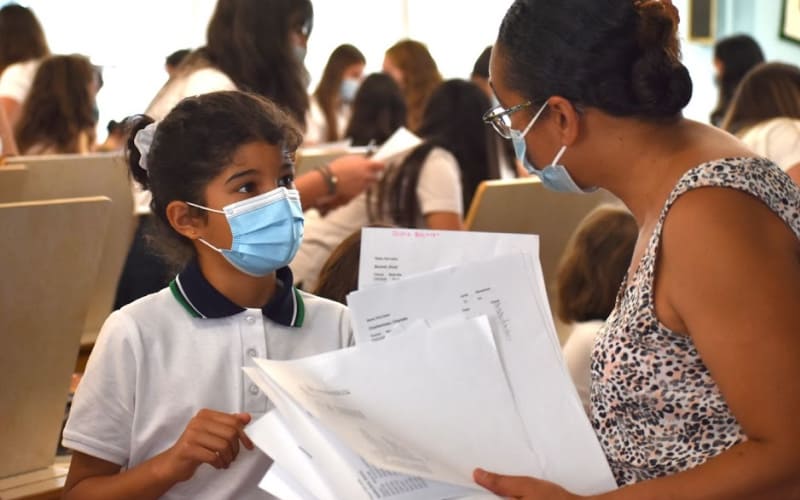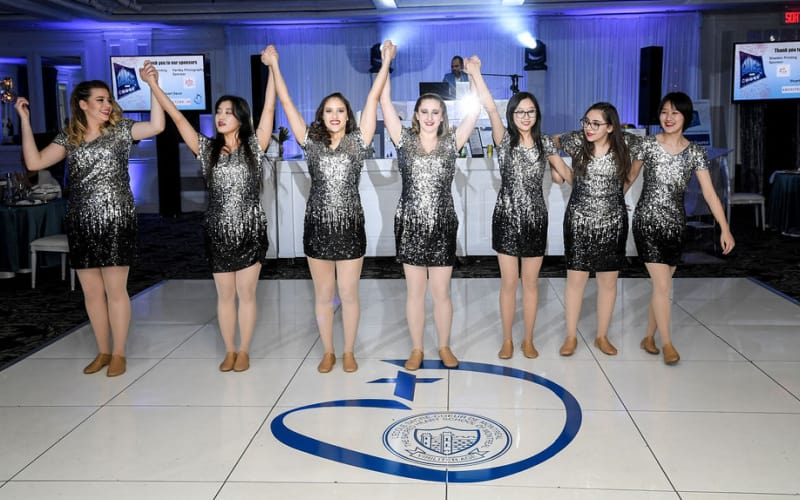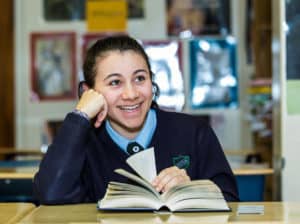Grade 7 (Sec. I)
Offered in French for all students.
- Introduction to the basic elements of visual arts: color, line, texture, shape and volume.
- Application of these elements to 2 and 3 dimensional works.
- Using classical and contemporary artworks as inspiration, students will create their own works. They will learn not only to appreciate works of art but to create their own artistic vision.
The English Language Arts program promotes the love of learning by encouraging students to deepen their appreciation of literature and their understanding of language encountered in media texts. Students engage in open and respectful discussion of a wide range of ideas, including major ethical and moral dilemmas faced by humankind. The choice of literature and the topics of discussion and debate encourage intellectual development and a habit of reflection. Emphasis is placed on the fundamentals of language: vocabulary development, spelling, grammar, and syntax. Students begin to learn different forms of writing, such as character sketches, journals, short research essays, social letters, and descriptive writing.
This course seeks to examine the development of moral, ethical and religious thought in Western society by tracing its development and influence in ancient Greece and Israel. Through an understanding of the human need for religious expression, morality and the creation of ethical systems, students will come to understand the relevance of said systems in human societies from past to present.
Although multiple religious traditions will be studied, special focus will be placed on Christianity with emphasis on the Catholic religious tradition and its impact on the development of modern Quebec society. Additionally, there will be a brief examination of the history and traditions of the Order of the Sacred Heart, the Five Goals of all Sacred Heart schools, and an in-depth examination of Goal 2: A Genuine Respect for Intellectual Values.
Students are called to adopt a positive attitude with regard to the language and culture, and to master written and spoken French. They are encouraged to reflect on the language and become aware of its role in learning, structuring their thoughts and developing their imaginations. They are invited to discover the pleasure of mastering the French language and to understand the different cultures It represents in order to better situate themselves in the linguistic and cultural diversity of the contemporary world.
In high school, students learn to pay increasing attention to the interaction between the various communication elements of a situation and their impact on the meaning of texts. They increase their understanding of the intention behind texts they hear, read or watch, which helps them understand the meaning. They also learn to communicate their message effectively in a framework of authentic, varied and meaningful communication situations.
In high school, students deepen the skills acquired previously, and develop further knowledge of the language, learning in increasingly varied contexts where they must demonstrate increasing autonomy. In addition to enriching their vocabulary and their repertoire of cultural symbols through diverse current and literary texts of increasing complexity, they develop their ability to make use of situation-specific knowledge as well as French phonetics and grammar. They also learn to use a system that allows them to develop their skills in French and their competencies by interacting, reading or writing texts in that language.
This course is taught over a two-year period and its emphasis is on Territory interpretation and human dependency on specific territories. These include: Urban, Agricultural, Forest, Protected and Native. By encouraging students to look at territories from a geographic perspective, this course helps to make today’s world more intelligible to them. Students examine the relationships human beings have with space, and in so doing they acquire the tools and language of geography and learn about the concepts needed to resolve territorial problems.
The purpose of this two-year programme is to use the historical method to examine and interpret social phenomena from a historical perspective by acquainting students with past civilizations through the study of everyday life, social customs, and religious practices. Secondly, we raise the students’ consciousness of citizenship through the study of basic political concepts such as monarchy, democracy, dictatorship and empire as well as the winning of civil liberties.
Students in Advanced French are exempt from this course.
The global objective of this course is to gain knowledge and develop an understanding of French culture and civilization. Learning activities will focus on a collaborative approach. In teams, students will achieve the course goals through research, reading, listening activities, reports and group discussions. Learning activities will culminate in the production of documents, posters, booklets, or oral presentations, interviews, and skits.
Secondary I will begin with a review of material from grade six to ensure students are all adequately prepared for high school mathematics. The algebra and arithmetic section of this cycle focuses on number sense with respect to decimal and fractional notation, with operation sense and an understanding of proportionality. The concepts of variables and algebraic expressions are also introduced as well as solving first-degree equations. The geometry component focuses on the fundamental elements of triangles and also the study of angles, quadrilaterals and geometric constructions. Finally, in statistics students look at how to generate statistical reports and the accompanying data.
Instrumental music offers students the opportunity to learn the technical skills required to play a band instrument (woodwind, brass, or percussion), to read and write musical notation, to work and play as a vital member of an ensemble, and to appreciate a wide variety of musical experiences. Students will be introduced to a variety of musical styles, periods, and composers, and will receive instrument-specific instruction throughout the year.
This course supports academic skills, social emotional, mental, physical and spiritual health of the students. It examines good decision-making and includes appropriate topics for all grade levels.
In Secondary I, PD focuses on executive functioning skills (organization, study skills, test taking, note-taking, learning styles, exam prep), transitioning to high school, workshops about peer pressure, body image, healthy relationships, stress, digital citizenship and more.
Students will learn the fundamental skills, strategies and regulations involved in a variety of sports, games and activities. Students will learn about adopting a healthy and active lifestyle through ongoing health activities, assignments and discussions. The health focus for the year will be “Hygiene”.
The secondary 1 course focuses on “The Living World” and “Earth and Space”. The course begins by exploring the idea of what science and the scientific method is and why it is important in our modern world. Once this is established the students examine “The Living World”, by looking at topics such as the diversity of life, reproduction of living organisms and life sustaining processes. The year is completed by looking at, “Earth and Space”, by learning about topics such as characteristics of the Earth, geological phenomena and astrological phenomena.
The idea of this Educational Technology (Ed Tech) course is to introduce students to the online tools that they will need throughout high school. It will prepare students to use these tools effectively and responsibly. The skills learned and practiced in this course will help students complete tasks in all of their other classes. If time permits, an introduction to some more advanced computer topics will be explored, such as algorithms, computational thinking, web design and/or 3D design.


